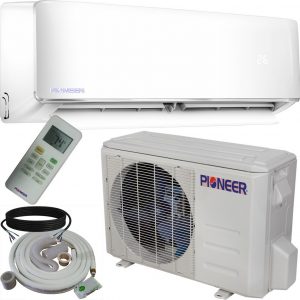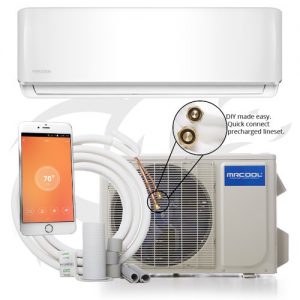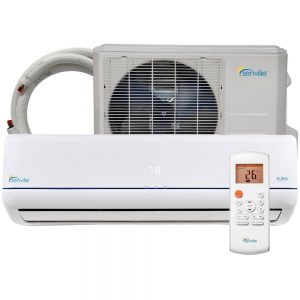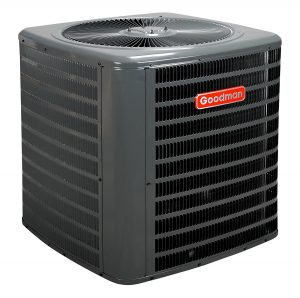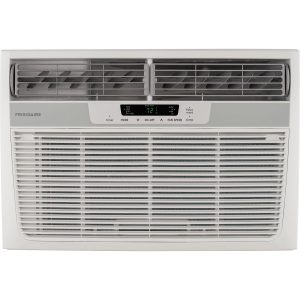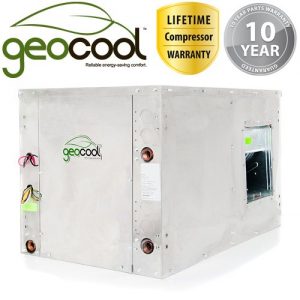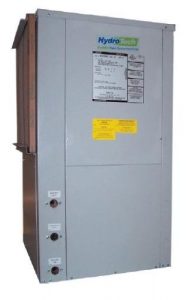A heat pump is a type of air conditioning system that can also be used to heat a space. Most heat pumps consist of 2 parts. The indoor component is called the “air handler” while the outdoor component is the one typically referred to as the electric heat pump itself. One of the main advantages of the heat pump system is that it doesn’t actually generate heat, but instead harvests it from the surroundings. Because of that, it consumes very little energy compared to something like a traditional furnace. As a general rule heat pumps alone are recommended for moderate climates. Whereas in extremely cold climates a supplemental heat source may also be necessary. That said let’s look at our choices for the Best Electric Heat Pump.
Top 7 Best Electric Heat Pump 2022 With Comparison Chart
Top 7 Electric Heat Pump Systems Review
[wpsm_titlebox title=”1″ style=”3″]Pioneer WYS012-17 Air Conditioner/Heat Pump 12000 BTU
The WYS012-17 is an inverter system that’s extremely efficient. This unit is capable of operating in any of 4 different modes: heating, cooling, ventilation, or de-humidification.
Features
- Fully programmable out to 24 hours in advance.
- The compact wall-mounted design is a space saver for smaller homes.
- A ductless system makes for easy installation and maintenance.
- Automatic restart reboots the system to the last settings after a power outage.
The system can be controlled manually or completely automated if you so wish. Or you can operate in a sort of hybrid fashion where some operations are automated but you retain the ability to tweak settings as conditions require.
[wpsm_column size=”one-half”][wpsm_pros title=”PROS:”]- The system has a wide range of potential indoor temperature settings from a low of 62 to a high of 90 F.
- The heat pump feature will work effectively within an outdoor temperature range of 5 to 86 F.
- Add your heat pump to the Internet of things via the built-in Wi-Fi capability.
- A robust customer support system allows for years of trouble-free performance.
- All components are UL tested and approved.
- The instruction manual is not very helpful.
- Installing it is not a DIY project regardless of what you may hear.
MRCOOL DIY 24K BTU 16 SEER Ductless Mini-Split
Mr Cool has designed this 24K BTU heat pump system specifically for do it yourself installation and we have to say it is one of the easier systems on the market to install.
Features
- Fully controllable from afar via Android or Apple phones and tablets.
- Precharged linesets drastically reduce hassle involved with installation.
- Completely ductless system makes for easy maintenance.
- Impressive warranty on parts and compressor.
If you’re able to follow directions and take your time you should be able to install the system and get it running in an afternoon. Linesets are precharged with environmentally friendly refrigerant and all electrical hookups are simple and well thought out. The unit itself comes with a 5 year warranty on parts and 7 years on the compressor, which is pretty impressive for a system designed to be installed by amateurs.
[wpsm_column size=”one-half”][wpsm_pros title=”PROS:”]- Easy to understand and follow installation instructions.
- Built-in refrigerant leakage detection helps prevent undetected corrosion.
- All electrical connections are pre-wired. Just plug and play.
- Mr Cool Remote App to control your heat pump system from afar.
- Always come home to a nice warm house.
- With any DIY system, there is always the risk of something going wrong.
Senville 12000 BTU Mini Split Air Conditioner
The Senville 12K BTU Heat Pump has one of the wider operational ranges and is effective down to -22 Fahrenheit.
Features
- Energy Star Certified system.
- Virtually silent operation when compared to the furnace or other heat pumps.
- An anti-microbial filter ensures the heated air is healthy as well.
- Air vents can be adjusted to multiple directions.
This is a notably quiet unit that brings the heat on those incredibly cold mid-January nights when other heat pumps fail or need help from a supplemental system. If you’re looking for a heat pump to help keep the new addition warm this winter or you’ve tripped out the garage and need to add heat as the final touch this is the system for you. It’s also a relatively easy system to install although not for first-time DIYers.
[wpsm_column size=”one-half”][wpsm_pros title=”PROS:”]- Capable of providing heat when the ambient temp is as low as -22 Fahrenheit.
- Standard 5 year warranty on parts and 7 years on the compressor.
- So quiet you likely won’t know it’s on except for how warm you feel.
- An attractive system that’s more than just a pretty face.
- DC inverter provides unmatched efficiency and reliable performance.
- Negative #1
- Negative #2
- Negative #3
Goodman 3 Ton 16 SEER
This Goodman Heat Pump/Air Conditioner provides high-performance heating and cooling at both the high and low ends of the temperature spectrum.
Features
- SEER (Seasonal Energy Efficiency Ratio) rating of 16.
- Programmable performance for added convenience.
- Foam compressor blanket aids in keeping the noise down.
- Proprietary SmartShift Defrost technology.
This is an efficient 16 SEER unit that won’t send your electricity bills through the roof and will keep any room cozy warm through the toughest of winters. It’s not the quietest system on the market but quiet in this case is relative since none of the units in this list are going to keep you awake at night. By and large, it’s a dependable, well-made heat pump you (or better yet your local HVAC pro) will be able to install with confidence.
[wpsm_column size=”one-half”][wpsm_pros title=”PROS:”]- Attractive outdoor cabinet built to endure.
- Environmentally friendly R410A refrigerant won’t harm the ozone.
- May qualify for energy efficiency tax credits depending on your locale.
- Relatively lightweight and compact.
- Won’t send your electricity bills through the roof.
- Customer service may not be up to everyone’s standards.
Frigidaire 8000 BTU Compact
The Frigidaire 8000 BTU heat pump is designed to provide effective heating for a room up to 350 square feet
Features
- One of the few heat pumps you’ll find that offer window mounting as an option.
- Multi-function remote control with 24-hour programmability.
- 8K air conditioning and 7K heating with supplemental 3.5K heating capacity.
- Near silent operation so it’s ideal for nursery or bedroom.
This unit is extraordinarily quiet and gives you the option of programming it out to 24 hours in advance. You’ll never arrive home to find your favorite room cold again. It’s Energy Star certified and features Sleep Mode should you forget to turn it off. The unit offers optional window installation although to be sure you’ll want to pass on that if you live in an extreme climate. The unit is UL tested and certified and AHAM approved as well.
[wpsm_column size=”one-half”][wpsm_pros title=”PROS:”]- Temperature control is precise and responsive.
- Comes with energy saver mode and sleep mode to conserve energy.
- Built in ‘check filter’ alert lets you know when filter issues arise.
- Handsome design won’t negatively impact your home’s curb appeal.
- Capable of dehumidifying 1.5 pints per hour.
- Some customers have questioned long-term reliability.
GeoCool 2.5 Ton Horizontal Geothermal
The GeoCool 2.5 ton heat pump is built using the latest in geothermal technology and can reduce heating costs by as much as 70%.
Features
- American made quality throughout.
- Highest Energy Star certification rating.
- Built-in diagnostic capabilities make maintenance a snap.
- Compact size and near-silent operation.
The GeoCool 2.5-ton heat pump boasts the highest Energy Star Rating and may also be eligible for government tax credits related to the use of geothermal energy. The air conditioning unit utilizes R410A environmentally friendly, the ozone-safe refrigerant which makes this an environmental winner no matter how you look at it. Made in the USA and designed to stand up to whatever mother nature can throw at it the GeoCool 2.5 ton geothermal heat pump will significantly lower your energy bills while making your home a more comfortable and environmentally responsible place.
[wpsm_column size=”one-half”][wpsm_pros title=”PROS:”]- This type of geothermal system typically uses 50% less electricity than other heat pump systems.
- A geothermal system utilizes the earth’s natural inner heat thereby negating the need for fossil fuels.
- Since there is no outdoor condensing unit the system is much quieter than other types of heat pumps.
- That natural energy source won’t be depleted for several billion years.
- Installation is quick and the unit needs virtually no maintenance.
- While maintenance costs are typically low installation costs can be higher than with other types of heat pumps.
Hydro-Tech Cupronickel 4 Ton 14.7 EER
On the SEER (Seasonal Energy Efficiency Ratio) scale the higher the number the more energy efficient. And with a SEER rating of 14.7, this Hydro-Tech Water Source Heat Pump is among the most energy-efficient available.
Features
- Can be run as a standard heat pump or as a geothermal unit.
- SEER rating of 14.7 translates to low energy bills going forward.
- Thoroughly tested before being brought to market.
- Removable access panels on the unit make maintenance a breeze.
A water source heat pump is one where a briny solution inside ground pipes draws energy from a water source. That energy is then transformed to heat and distributed throughout the home in a manner reminiscent of the steam heat systems of old (although different in the details to be sure). This Hydro-Tech heat pump then is not what most people will think of when they think of heat pumps. Still it’s a remarkably effective and efficient system for heating part or all of your home.
[wpsm_column size=”one-half”][wpsm_pros title=”PROS:”]- The heat pump sports a tiny footprint that won’t gobble up real estate.
- Outstanding thermal efficiency and noiseless operation.
- The unit is insulated with anti-microbial materials that make for a healthier indoor environment.
- Field reversible blower assemblies help optimize airflow.
- Fully digital control capability.
- Negative #1
- Negative #2
- Negative #3
Different Types of Electric Heat Pumps
Heat pumps are generally defined as any device that harvests heat from a cool environment and transfers it to a warmer environment, which actually runs against the grain of nature. Because they require electricity to power the harvesting and transfer of heat they can’t technically be considered renewable energy, although they’re as close as any type of non-renewable can come to that designation. The various types of heat pumps in use today on residential and commercial buildings are:
- The ductless mini-split system – This is probably the most common form of heat pump system being used in homes today and is characterized by the wall-mounted component that is typically used to heat individual rooms. There are no heating ducts with this type of system so they are easy to install and maintain. These are essentially the same as the air source heat pump but work on a smaller scale.
- Air source heat pumps – This type of heat pump is typically fitted to the exterior of a structure and draws in air from which it harvests heat. That heat is then fed directly into the household heating system to warm the home without burning fossil fuels. While these systems were a bit unwieldy when first introduced they have been refined to the point where they are now extremely energy efficient and have become quite popular. They do have their performance limits, however.
- Geothermal heat pumps – With this type of heat pump pipes are laid directly into the ground that draws upon the earth’s own heat and transfers it into the home or business. This type of system is extremely dependable since the internal temperature of the earth once you get away from the immediate surface is predictable and stable. The trade-off however is a higher setup cost since extensive excavation will be required.
- Water source heat pumps – With this type of system water is heated either by the sun or by geothermal heat and then circulated within the home or business to provide warmth. When pipes are laid in the ground they are submerged in a water source from which a briny solution in the pipes absorbs the available heat. That brine is then circulated through the heat pump which extracts the available energy and transfers it to the home or business to provide warmth. These systems are very efficient but also require a higher setup cost.
- Hybrid heat pumps – A hybrid system is one of the above-described systems that often (but not always) have a fossil fuel-powered system to back it up. You’ll typically find these types of heat pumps in areas that experience temperature extremes because some air source heat pump systems, for example, are unable to extract energy from outside air once the temperature drops below a certain point. The hybrid system ensures you’ll always have adequate heat in such places which is important to avoid pipes freezing and bursting and to maintain a healthy environment for everyone in the home. Some hybrid systems will combine air and ground heat sources. This way when the air becomes too cool to be usable the ground source kicks in and picks up the slack. Hybrid heat pumps are a good idea if you can afford them simply because they provide that extra measure of insurance against a cold house.
- The way of the future – Because they utilize so many readily available non-fossil fuel energy sources and because the concepts behind them are typically easy to understand heat pumps have gained quite a lot of traction with homeowners. Yes they require electricity to operate which means you’ll see a bump in your electricity bills but the increase will be more than offset by savings in oil or gas consumption.
Wrapping Up
The best heat pump designs are future-tech that is with us now. They constitute one of the smartest ways to reduce our dependence on fossil fuels, reduce the amount of CO2 released into the atmosphere, and ensure we leave our children and grandchildren a world worth living in.
[/wpsm_titlebox]Related Articles-



